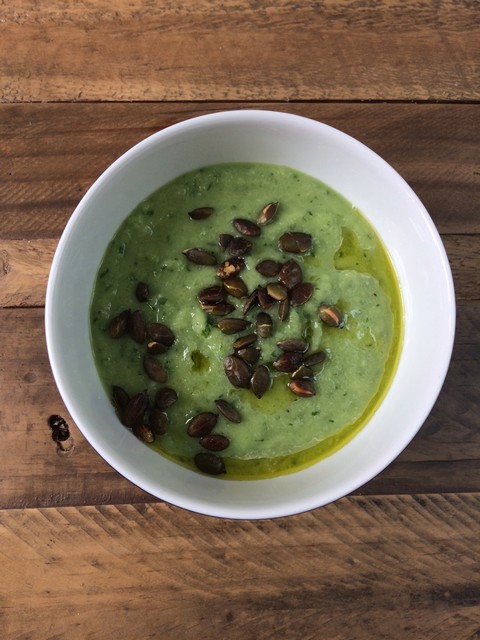Rob’s Recipe of the Week: A Provencale Tian
Text and photo from: https://www.cuisinefiend.com/242/courgette-and-spinach-tian
What’s a tian? In spite of sounding rather middle-Eastern or even oriental, it’s a Provençal pan made of clay, enamelled in bright colours, which they use to cook vegetable gratins in. Or, indeed, tian, as it’s also the name of the dish.
They sell tian pottery at the markets all over Provence and you can hardly pass by the stalls without stopping to admire the vivid colours, the glaze and the various shapes. If pottery wasn’t fragile and rather heavy, I’d have a collection brought over from my French voyages… As it is I need to use boring mass-produced vessels to cook my tians et al in.
They come in all sorts, being basically roasted vegetables with cheese. Rice is a common ingredient, sometimes potatoes, and spinach is a veritable tian king. Eggs are frequently added but I skipped them here, aiming for a less quiche-y flavour. And make a note of the courgette treatment – that’s how this boring vegetable needs to be handled. Squeeze the living daylights out of it and it might just be vaguely tasty.
Courgette and Spinach Tian
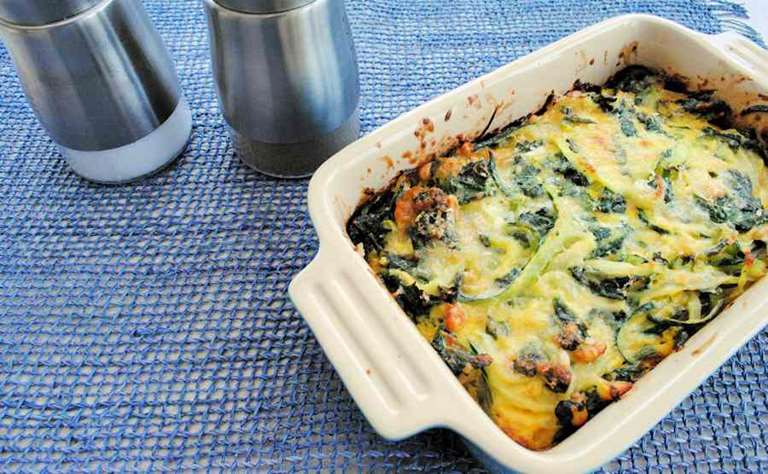
INGREDIENTS
1 large courgette
200g fresh or frozen spinach (thawed)
2 tsp sea salt
2 cloves of garlic, peeled and finely chopped
2 spring onions, chopped
a handful of pine nuts
60ml double cream
1 egg yolk
30g grated hard cheese, Gruyere or Cheddar
20g grated Parmesan
a little olive oil
METHOD
- Wash, top and tail the courgette and cut it into ribbons or noodles on a mandolin or in a spiralizer. Sprinkle with salt, stir it around and place in a colander for at least 10 minutes. After that time rinse it with cold water, squeeze out as much moisture as you can without squashing the courgette, and pat dry with paper towels.
- Rinse the spinach, if using fresh, and wilt it in a microwave or blanch briefly in boiling water. When cool, squeeze out the liquid and chop finely.
- Mix the cream with the egg yolk and add the hard cheese. In a bowl mix the courgette with spinach, pine nuts, garlic and spring onions and most of the Parmesan. Pour over the cream mixture and stir through.
- Preheat the oven to 220C/425F/gas 7.
- Drizzle a little olive oil in the bottom of a tian or gratin dish, transfer the vegetables into it and sprinkle with the remaining Parmesan. Bake for 20 minutes until brown and bubbling. Best serve very warm, instead of piping hot.
From https://www.cuisinefiend.com/242/courgette-and-spinach-tian
Rebecca’s Recipe of the Week: Three Salad Dressings for Kale or other Hearty Salad Greens
Several people have been asking for things to do with kale, pak choi, and other robust greens. Among other things you can make them into excellent salads. In all cases, it’s a good idea to manhandle the greens a bit to soften them up. Shred them fine and, using your hands, scrunch them up as hard as you can for a few minutes. Confronted with this vigorous treatment, they will become much softer and more tender. Pak choi does not need as much scrunching as kale or cabbage, but it will benefit from a bit body English.
Once you’ve scrunched your salad, you need an oomphy dressing to stand up to these greens. I thought I would offer a compilation of some of the salad dressings that I’d recommend to complement these hearty greens. All three are incredibly simple: you just whizz them up in a blender or mix them with a fork. And if you don’t mind doing your scrunching after you’ve dressed the salad, the tenderising effect will be even more noticeable. Once you’ve done that, you can add anything else you like: leftover boiled potatoes, toasted pumpkin seeds, shredded white or black radish, olives, chick peas….
(I was intending to present a fascinating but somewhat weird recipe for a beetroot-based vegan brownie, using a recipe I tore out of an Air France inflight magazine. Extensive testing on my colleagues at work led me to change my mind. The consensus was that the recipe must be part of a plot to denigrate vegans!)
Miso-Tahini Dressing
Serves 2
Ingredients
1 tablespoon miso paste
1 tablespoon tahini
1 tablespoon soya sauce
1 tablespoon cider vinegar
Preparation
Combine the ingredients and blend well, using a fork. Taste to see if it would benefit from a little more vinegar. The mahogany-dark dressing is now ready to use. This makes enough for half a small cabbage, shredded, together with several grated carrots. It is also good on other greens.
Spring Onion and Tahini Blanket
Enough to dress a large 2-person salad
Ingredients
4 spring onions, including the green bits
2 tablespoons tahini
2 tablespoons rapeseed oil
2 tablespoons lemon juice
2 tablespoons water
Salt and pepper, to taste
Preparation
Roughly chop the spring onions.
Place everything in a blender, Nutribullet, or the container for an immersion blender. Blend everything until smooth. Check to see if it needs more salt, pepper, or lemon juice. If it’s too thick for your liking you can add a little more water to thin it out, and then serve either as a salad dressing, or as a dip.
Super Turmeric Sauce
serves 2
Ingredients
2 tablespoons cashew butter
2 teaspoons Dijon mustard
juice of 3 clementines
2 inch piece of fresh turmeric, peeled
5 tbsp olive oil
Preparation
Combine the ingredients in a blender and whizz until smooth.
Rebecca’s Recipe of the Week: Golden Pumpkin Curry
This is an absolute flavour bomb. The combination of onion, spice and pumpkin is delicious, fresh and complex, with a savoury depth that you will savour. Serve with rice, and a garnish of fresh coriander, if you like, for a little touch of green.
If you want to make this vegetarian, you can apparently replace the fish sauce with an equal amount of Japanese miso, but I used fish sauce
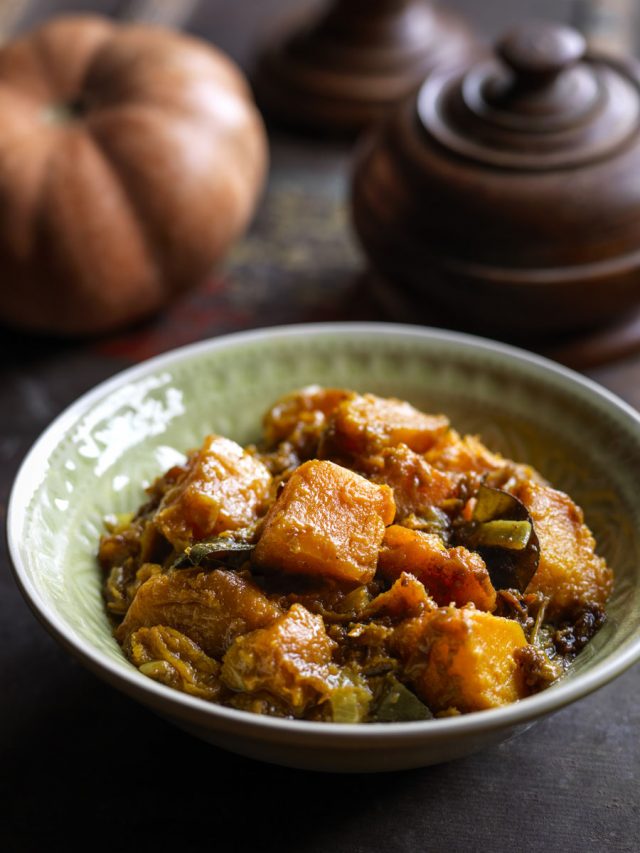
Burmese Golden Pumpkin Curry (Shwe Hpayone-thi Chet)
Servings 2 as a main
Ingredients
100 ml rapeseed oil or other neutral-tasting oil
2 teaspoon ground turmeric
2 teaspoon ground coriander
2 teaspoon ground cumin
2 teaspoon paprika
16 fresh or dried curry leaves
3 medium onions, sliced
3 spring onion, green and white parts, shredded
4-6 garlic cloves, sliced
3 cm piece of ginger, peeled and grated
1 small squash or pumpkin, peeled and cubed
1 tablespoon sugar
4 tablespoons fish sauce
Instructions
Heat the oil in a saucepan over a high heat. Add the turmeric, coriander, cumin, paprika and curry leaves to the oil and allow to sizzle for a few seconds.
Now turn the heat down to medium and add the onions, spring onion, garlic and ginger and fry for 10 minutes, until fragrant and the onions have wilted and some have crisped up.
Add the squash, sugar, and 300ml of water. Stir well. Cover and cook for 25 minutes, or until the squash is tender. Add the fish sauce, stir again and serve with rice.
Recipe adapted from Mimi Aye, Mandalay: Recipes and Tales from a Burmese Kitchen (2019).
Also available online at https://www.kaveyeats.com/2019/11/mimi-ayes-golden-pumpkin-curry.html
Rob’s Recipe of the Week: Vegan ‘omelette’ for filling
I picked up this recipe whilst living in Gothenburg and it has great connotations for me with sunny breakfasts on the pier… Hopefully I don’t just see it with rose tinted glasses!
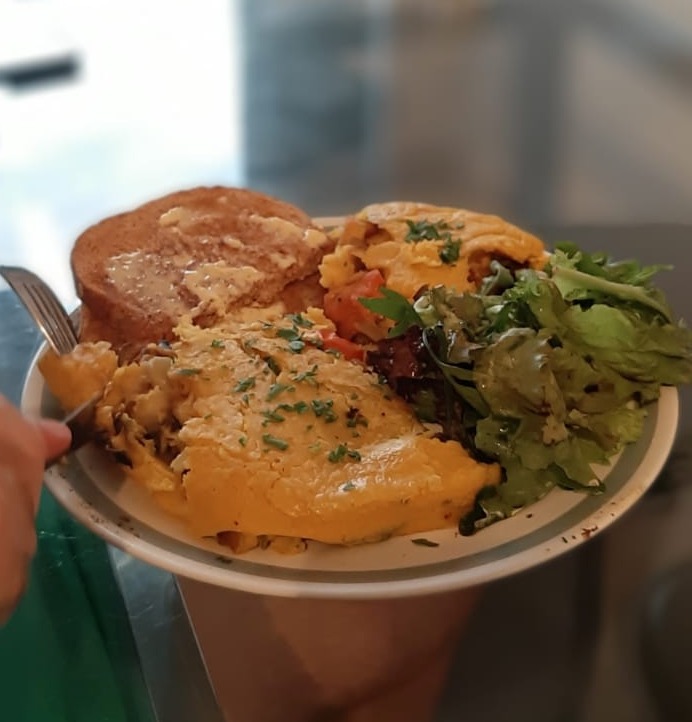
Vegan chickpea flour (kikärtsmjöl) omelette
Ingredients
1 cup (120 g) chickpea flour
1 Tablespoon flaxseed meal or chia seed meal (optional)
1/2 tsp (0.5 tsp) salt
1/4 tsp (0.25 tsp) each of turmeric garlic powder, baking soda, cumin powder
1ish cup of waterFillings!
Fried tomato, onion, mushrooms, lots coming in our shares that could suit!
Method is simple, mix the all the dry ingredients then add the water slowly and mix with a whisk until they take on the same consistency as whisked eggs. Fry up the fillings, then poor on the omelette mix and reduce pan to a medium to low heat. Make sure you cook it slower and longer than an egg omelette – it tends to burn before solidifying enough to flip if you rush it.
Rebecca’s Recipe of the Week: Spring Onions and Tahini
It seems a pity to discard the flavoursome green leaves from a Canalside spring onion. This punchy blend of spring onion and tahini puts them to good use. It makes a great dressing for a spinach salad, coating the leaves in a savoury, creamy blanket. You could also use it as a dip.
Spring Onion and Tahini Blanket
Enough to dress a large 2-person salad
Ingredients
4 spring onions, including the green bits
2 tablespoons tahini
2 tablespoons rapeseed oil
2 tablespoons lemon juice
2 tablespoons water
Salt and pepper, to taste
Preparation
Roughly chop the spring onions.
Place everything in a blender, Nutribullet, or the container for an immersion blender. Blend everything until smooth. Check to see if it needs more salt, pepper, or lemon juice. If it’s too thick for your liking you can add a little more water to thin it out, and then serve either as a salad dressing, or as a dip.
Rob’s Recipe of the Week: An Alternative to Stir Fry for Onion
We’ve been getting spring onions in the share for a few weeks now, so I thought I would try something different to the usual stir fries and salads… The recipe this week is for spring onion dip! This should go well with courgette sticks, chips (oven baked from the new potatoes) and even fennel. Enjoy best served straight from the fridge, preferably after having a couple of days for the flavours to intensify.
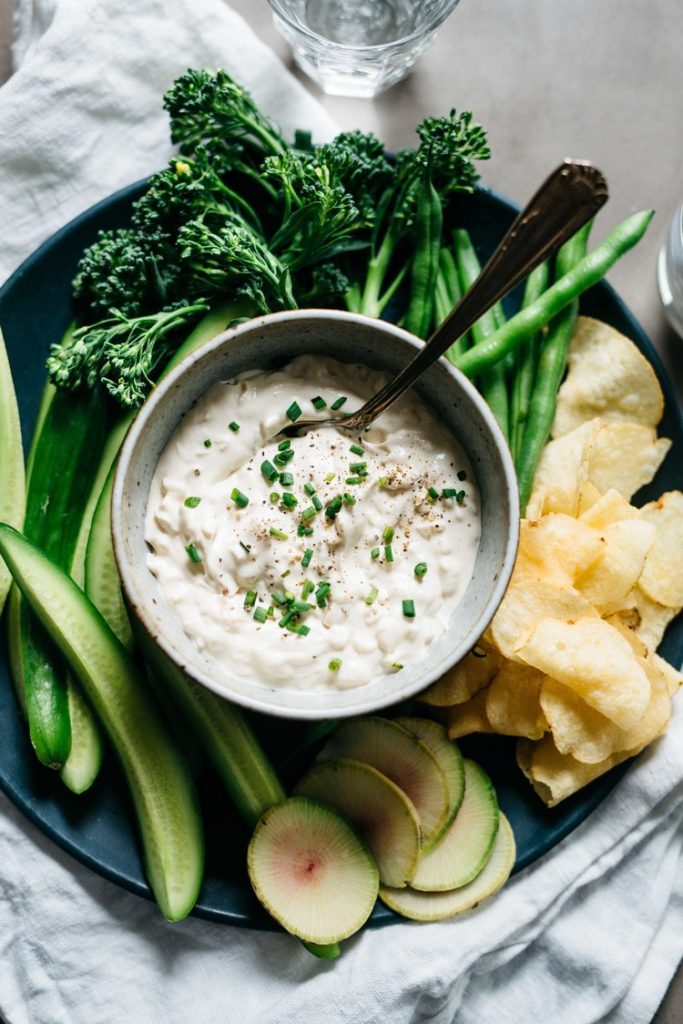
Spring onion dip
Ingredients:
3 tablespoons extra virgin olive oil
1 1/2 cups chopped spring onions
1 1/2 cups raw cashews, soaked overnight or at least 2 hours
fine sea salt
1/2 cup cream cheese (Tesco and Sainsburys both do good vegan alternatives)
1 tablespoon lemon juice
1 1/2 teaspoons apple cider vinegar
1 teaspoon tamari
1/4 teaspoon garlic powder
1/3 cup water, plus more if necessary
chives, for garnish
Method:
Heat a large pan over medium heat. Add 2 tablespoons of olive oil, the onion and a few pinches of salt then stir. Caramelise the onions over 10-12 minutes (stirring occasionally) then transfer to a plate and let cool
Meanwhile, add the cashews, cream cheese, lemon juice, vinegar, tamari, garlic powder, water and 1/2 teaspoon salt to the container of an upright blender (preferably high-speed). Blend on high, scraping down the sides until the dip is smooth and creamy
Taste and adjust the salt and/or lemon juice, as needed
Pour the dip into a bowl, and fold in the onions
Transfer to an airtight container and refrigerate for at least 3 hours, or overnight to really develop the onion flavor.
Rebecca’s Recipe of the Week: Peas (and Salmon)
Peas cooked with onions and butter make an excellent dish to eat on their own. The peas in the share are sugar snaps, so you can eat the whole thing including the pod. Why not try cutting these up to add to this recipe? Add some pan-seared salmon fillets and you have an easy and very delicious meal.
(To pan-sear, dry the salmon carefully and then season liberally with salt. Heat a little neutral oil in a skillet, and when it is hot add the salmon, skin-side down. Press it into the pan with a fish so that it makes good contact with the heat. Cook, without moving the fish, for about 3 minutes, and then flip it over to cook the other side. Cook for an additional 1-4 minutes, depending on how cooked you like your fish.)
Peas with Parsley, Thyme, Butter and Onions
Serves 4 as part of a larger meal.
Ingredients
2 tablespoons neutral oil (rapeseed, sunflower seed etc.)
1 giant Canalside spring onion, thinly sliced (use the whole thing including the dark green leaves)
½ teaspoon salt
1/2 cup white wine
1 cup chicken stock
4 cups frozen (or fresh) peas (or pieces of sugar snap peas including the pods)
4 tablespoons butter
¾ cup fresh parsley, roughly chopped
5 springs of fresh thyme, roughly chopped
Preparation
Heat the oil in a large frying pan over medium heat. Add the sliced onion and the salt. Reduce the heat to low and cook until the onion is translucent and soft, but not brown. Add the wine and allow to reduce until almost completely dry.
Add the stock and bring to a boil. Add the peas and butter and cook until the stock has reduced, and the sauce is thick and silky with butter. Then add the parsley and thyme check for salt and pepper, and serve.
Recipe adapted from Abra Berens, Ruffage: A Practical Guide to Vegetables (2019).
Rebecca’s Recipe of the Week: Diana Henry’s Uzbeki Carrots
Carrots simmered in warm spices with dried fruit, topped with pistachio nuts and salty yoghurt. You will enjoy this. I served it with a surprisingly complex beetroot salad dressed with balsamic vinegar and maple syrup, mixed with shredded daikon radish, a root-vegetable hat trick, but that’s for another day.
The recipe calls for 1 tablespoon of barberries, which, amazingly, I happened to have. I think you can leave it out. You could also serve this over pasta, or in a pita with a shredded hard-cooked egg.
Uzbeki Carrots
Serves 2-3.
Ingredients
3 tablespoons olive oil
1 onion, thinly sliced
2 tomatoes, cut into thin wedges (or several tinned tomatoes)
4 garlic cloves, finely chopped
½ Canalside chile, seeded and shredded (or to taste)
¼ teaspoon ground cinnamon
½ teaspoon ground cumin
salt and black pepper
500g carrots, peeled and cut into batons
75g currants
1 tablespoon dried barberries (entirely optional)
¼ teaspoon saffron
350ml water (or use some of the tomato juice from the tin if you’ve used tinned tomatoes)
1 tablespoon tomato paste
2 teaspoons honey, or to taste
To serve:
2-3 tablespoons shelled unsalted pistachios, coarsely chopped
Salted yoghurt
Fresh coriander, chopped
4 spring onions, sliced
Preparation
Heat the oil in a large saucepan and sauté the onion over medium heat until golden brown, then add the tomatoes and cook until they begin to soften. Add the garlic and chile and cook for another minute, then the cinnamon and cumin and cook for another minute. Add a couple pinches of salt and pepper, and then add everything else, except garnishes. Bring to a gentle boil.
Reduce the heat and simmer the carrots until completely tender, 20-25 minutes. The mixture should remain moist but not be swimming in juice. If it gets too dry, add a little more water. If it is too sloppy, turn up the heat and boil off some of the liquid. Taste for seasoning and balance; the mixture should be sweet and savoury.
Serve topped with a generous dollop of yogurt, pistachios, coriander, and spring onion.
Recipe adapted from Diana Henry, A Change of Appetite: Where Healthy Meets Delicious (2014).
Rebecca’s Recipe of the Week: Spiced Salmon with a Coriander Salsa
Cooked slowly at a very low temperature, salmon becomes meltingly tender and immensely flavourful. It’s the complete opposite of the dry, overcooked fish one so often encounters. The fish is rubbed with a mixture of North-African spices and baked for nearly an hour. A coriander-packed herb salsa provides the perfect foil. Serve this with plain, boiled potatoes and a green salad for a spectacular meal.
The recipe is extremely easy—just make sure to allow an hour or two for the salmon to absorb the flavours of the spice rub before you cook it. This is a very good way of serving fish at a dinner party, since it doesn’t require any last-minute cooking.
Slow-roasted Spiced Salmon with Herb Salsa
Serves 6
Ingredients
For the salmon
2 teaspoons cumin seeds
2 tsp coriander seeds
2 tsp fennel seeds
3 cloves
½ tsp cayenne pepper
1 tablespoon turmeric
1 generous pinch salt
900g salmon fillet, skinned. Ask the fishmonger to pin-bone it.
Salt
1 tablespoon olive oil
For the salsa
2 medium shallots, finely diced
6 tablespoon lime juice
20g coriander leaves and tender stems, very finely chopped
2 tablespoon minced chile pepper. Remove the seeds if you don’t want this to be too hot
4 tablespoon spring onions, very finely chopped (green and white parts)
110ml neutral oil
Salt
Preparation
Toast the seeds and cloves in a dry frying pan over a medium-high heat and then grind finely with a pestle and mortar or a spice grinder. Transfer to a small bowl. Add the cayenne pepper, turmeric and salt.
Rub the spice mixture on both sides of the salmon, and refrigerate, covered, for one to two hours.
Heat the oven to 110C. Bring the salmon to room temperature while the oven is heating.
Drizzle the olive oil over the salmon and rub it in evenly with your hands. Roast in a baking dish for 40 to 50 minutes, until it begins to flake in the thickest part of the fillet when you poke it with a knife or your finger. Samin Nosrat notes that ‘because this method is so gentle on its proteins, the fish will appear translucent even when it’s cooked’.
While the fish is cooking make the salsa: In a small bowl, combine the shallot and lime juice and set aside for 15 minutes to macerate. In a separate small bowl, combine the coriander, jalapeño, spring onions, oil, and a generous pinch of salt. Add the shallots and lime juice, and more salt to taste.
Once the salmon is cooked, transfer it to a serving platter, spoon the herb salsa on top in generous amounts and serve.
Recipe adapted from Samin Nosrat, Salt, Fat, Acid, Heat (2017).
Pip’s Recipe of the Week: Hot weather? How about a cold soup?
Our resident Recipe Meister, Rebecca Earle, is having a break during July, and so newly joined member Pip Smith has stepped forward to tantalise our tastebuds in Rebecca’s absence. Thanks Pip for standing in. Here’s this week’s recipe, the final one from Pip in this guest slot – Rebecca will be back next time:
This is an adapted recipe from a soup in Anna Jones ‘a modern way to cook’ – it’s adapted only because I don’t have the recipe book anymore, otherwise I would have followed it! With all this hot weather there’s probably nothing more important than keeping well hydrated. We take in a lot of our daily water from our food, in particular from fruits and vegetables. When I looked at the cucumbers in my fridge I immediately fancied a cool and hydrating soup, here’s the recipe I used.
Avocado and cucumber soup
Ingredients:
1 1/2 cucumbers chopped
The flesh of 1 avocado
The juice of 1 lemon
1 handful of basil
2 spring onions
2 handfuls of toasted seeds
Extra virgin olive oil
Salt and pepper to taste
Method:
Pop the cucumber, avocado, basil, spring onion and lemon juice into a blender or use a stick blender and deep bowl.
Season with salt and pepper.
Dish into bowls, sprinkle with toasted seeds and a dash of extra virgin olive oil.
Optional – you might like to chill before serving. I mean the soup.
